Source: New Voice of Metaverse

Image Source: Generated by Wujie AI
As the world's largest consumer electronics show, CES 2024 is in full swing. With a history of 57 years, CES is the world's largest and most influential consumer electronics technology annual exhibition, and has become the stage for major global technology manufacturers to release new technologies and products.


Not only have upstream manufacturers such as AMD, NVIDIA, and Intel launched the latest chips, acceleration cards, and AI technologies for PC, data center, and even automotive fields, but many terminal manufacturers and other tech giants have also spared no effort to showcase their latest technologies in order to seize the initiative in future market competition.
The "Arena" of Chip Manufacturers
At this year's CES, the three major chip giants, NVIDIA, Intel, and AMD, are expected to take turns to release more new products around the hot topic of AI.
NVIDIA
NVIDIA has almost become the busiest company at this year's CES. They have not only brought the all-new GeForce RTX SUPER desktop GPU, the latest developments in the NVIDIA DRIVE series automotive business, but also released a generative AI service based on NVIDIA Picasso.
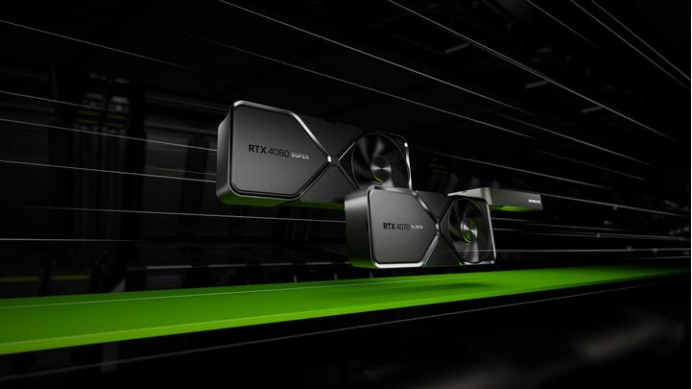

At the event, NVIDIA released the high-performance generative AI-enabled GeForce RTX SUPER desktop GPU, new AI notebooks from OEM partners, and new NVIDIA RTX-accelerated AI applications and tools for developers and consumers.
NVIDIA stated that this is a new GPU chip specifically designed for AI PC devices. The AI performance of this graphics card has increased by over 170%, allowing gamers, designers, and other users to better utilize AI technology. NVIDIA has announced that OEM terminal manufacturers such as ASUS, MSI, Lenovo, HP, and Samsung will provide AI PC devices based on the RTX 4080 SUPER.
In addition to releasing new consumer-grade graphics cards, NVIDIA also announced the progress of the NVIDIA DRIVE series automotive business.
NVIDIA mentioned that Ideal Auto has chosen the NVIDIA DRIVE Thor centralized in-vehicle computer to power its next-generation vehicles. In addition, Great Wall Motors, Xpeng, and Xiaomi have adopted the NVIDIA DRIVE Orin platform to support their intelligent autonomous driving systems.
During this CES, Mercedes-Benz, Polestar, Kodiak, Pebble, Lenovo, and others showcased the latest AI automotive products, all of which are based on the NVIDIA DRIVE series platform.
Furthermore, NVIDIA also announced a collaboration with Getty Images. Getty Images' iStock has released a generative AI service developed based on NVIDIA Picasso (an AI foundry for the visual design field), providing an AI model platform that creates 4K images from text, trained using authorized and commercially safe massive creative content from Getty Images.
Intel
At CES 2024, Intel launched a variety of new products in the 14th generation Core processor family, including desktop processors and the HX series mobile processors, as well as the all-new Core mobile processor 1 series for high-performance mainstream ultrabooks.

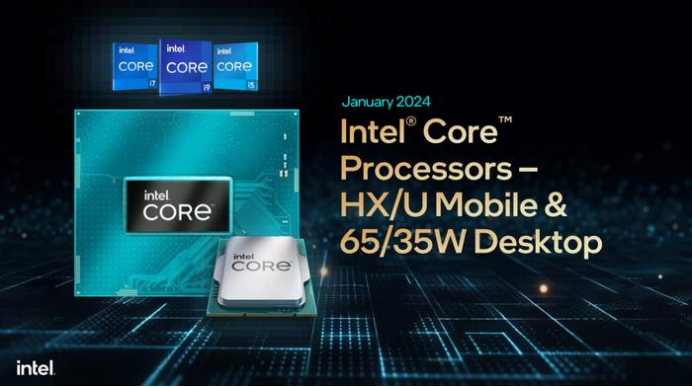
Looking at the desktop side, Intel's all-new 14th generation Core HX series processors are still built using Intel 7 process, with a maximum of 24 cores and 32 threads, a maximum turbo frequency of up to 5.8GHz, a slight increase in frequency compared to the previous generation, and some models have increased core counts and cache. It supports up to 192GB of DDR5-5600/DDR4-3200MT/S memory, and is backward compatible with the current Intel 600 and 700 series chipsets.
In terms of connectivity, it supports Intel Killer Wi-Fi 7 (5 Gig) and Intel Killer Wi-Fi 6E (Gig+); supports PCIe Gen 5.0/Gen 4.0 and Thunderbolt 4, which can provide 40Gbps bandwidth. In addition, it supports integrated USB 3.2 Gen2×2, providing up to 20Gbps transfer bandwidth.
Overall, Intel has further improved the layout of its product line, with a wide range of models available for desktops, from low-end to mainstream to high-end, as well as HX series models tailored for gamers, creators, and professionals, and Core U processors for mainstream ultrabooks, meeting users' needs for different performance levels.
AMD
At CES 2024, AMD will release the long-awaited 8000G series APU, bringing a stronger experience to desktop office use. They will also showcase the Ryzen Z1 Series processors, a series of processors specially designed by AMD for handheld gaming devices, in an effort to capture the latest handheld gaming market at CES 2024.
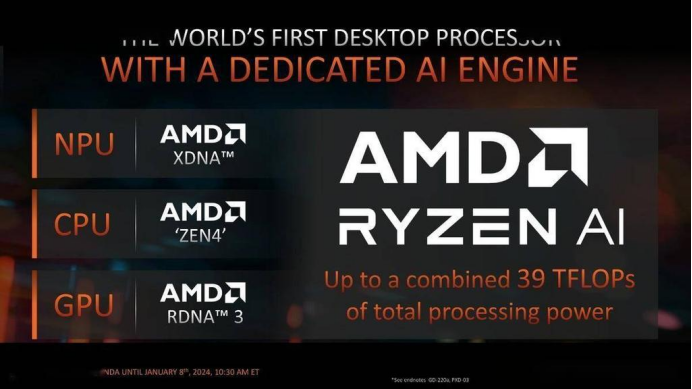

In terms of graphics cards, AMD has also released the Radeon RX 7600 XT 16GB graphics card. This graphics card has 32 compute units or 2048 stream processors, 64 AI accelerators, and ultra-high clock frequencies of up to 2.47GHz (game mode) and 2.76GHz (overclocking mode).
In addition, the graphics card's memory capacity has been increased from 8GB to 16GB, with a bandwidth of 288GB/s, and is equipped with 32MB of second-generation Infinity Cache.
For AMD, they not only need to continue to pressure Intel in the CPU field, but also keep up with NVIDIA in the GPU field, and still have the strength to develop the handheld gaming market. At this year's CES, AMD has already sufficiently demonstrated their ambitions.
The Battle for the AI PC Market
CES not only provides a stage for manufacturers to showcase their products but also an excellent window to understand the future development trends of the consumer electronics industry. Many industry insiders predict that AI PC has become the focus of this year's CES.
Lenovo
At CES 2024, Lenovo Group showcased more than 10 AI PCs, including the Yoga Pro 9i, which empowers the creative process, the world's first seamless switchable laptop and tablet mode ThinkBook Plus Gen 5 Hybrid, the world's first business AI PC ThinkPad X1 Carbon AI, and the new generation ultra-compact ThinkCentre neo Ultra.
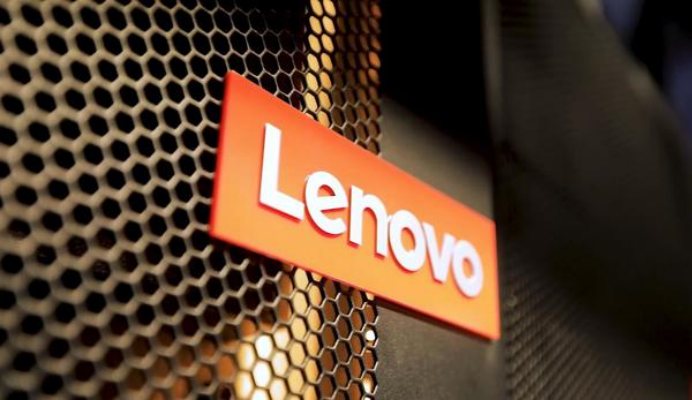

Among them, the flagship products Yoga Pro 9i and Yoga 9i are equipped with the latest Intel Core Ultra processors and Lenovo AI chips, designed for high-standard creators. The entire series is equipped with the Yoga Creator Zone generative AI software, which can transform text-based descriptions or sketches into stunning images without the need for any complex prompts, codes, or settings.
For the small and medium-sized enterprise market, Lenovo Group has introduced new AI-enabled ThinkBook products, ThinkCentre desktops, and accessories.
Previously, Lenovo Group's Chairman and CEO Yang Yuanqing defined the five core characteristics of AI PC for the first time, namely the ability to run compressed and performance-optimized personal large models, stronger computing power and larger storage, smoother natural language interaction, and more reliable security and privacy protection.
HP
HP announced the update of its flagship 2-in-1 laptops Spectre x360 14 and 16 at CES 2024. The new ultrabooks are now equipped with the latest Intel Core Ultra processors, high-resolution webcams, OLED screens, and Wi-Fi 7.

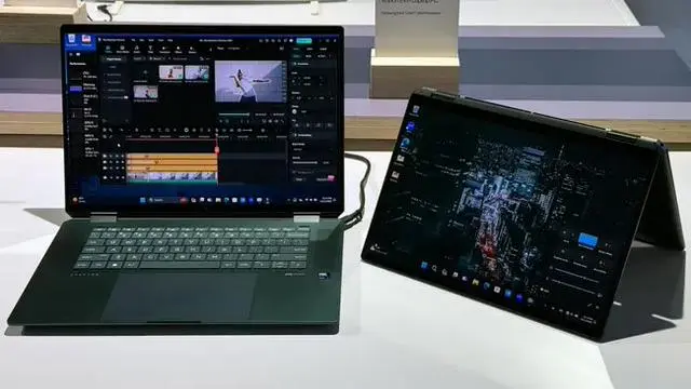
The new Intel Core Ultra chip is Intel's first processor with an onboard NPU, which should help with some AI tasks.
One notable feature of the new products is the 9-megapixel camera, higher than most laptop cameras. HP claims that this camera will feature hardware-assisted low-light adjustment.
The camera is also at the core of a series of HP-promoted features that use AI technology, including automatic lock for increased privacy in public places and screen dimming when the user looks away. Another non-camera feature is HP SmartSense, which can detect what the user is doing on the computer and adjust the cooling profile.
HP may be slightly slower than other players in the transition to AI PC, but this does not prevent them from already trying to understand how AI can help PCs. We also look forward to them releasing even better products.
ASUS
At CES 2024 held today, ASUS Republic of Gamers (ROG) officially announced the launch of the ROG Strix 8 series and equipped the ROG Strix 8 Super Competition series with the MiniLED Nebula Original Screen for the first time.

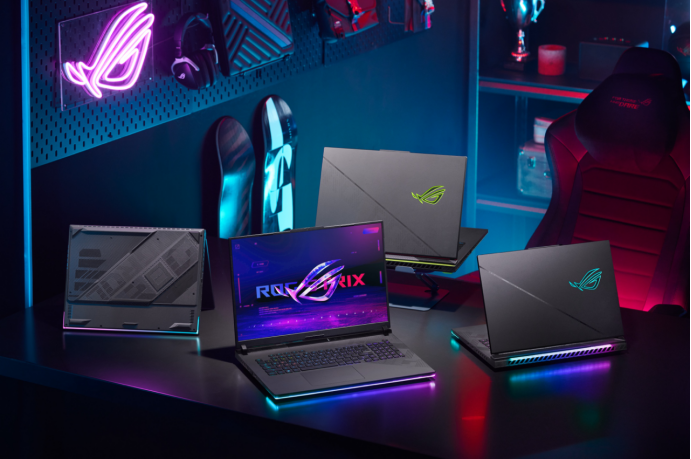
ASUS stated that the ROG Strix 8 Super Competition series is equipped with the ROG Nebula Original Screen based on Mini LED technology, with over 2000 backlight zones, peak brightness of 1100nit, and with the ROG Super Picture Engine, it can minimize ghosting and halo effects to the greatest extent. In addition, the ROG Nebula Original Screen also supports multi-zone and single-zone backlight switching, and with color gamut switching, it can also be used for professional content creation.
In addition, ASUS Republic of Gamers has launched the redesigned Zephyrus G14 and Zephyrus G16 gaming laptops.
These two gaming laptops are thinner and lighter, with borderless design keyboards, larger touchpads, and larger keycaps, upgraded speaker systems with 25% increased volume and 47% improved audio effects, and low-frequency response as low as 100Hz.
We can see that the release of the Republic of Gamers not only involves routine upgrades in gaming PC performance and design but also a comprehensive innovation towards AI.
Razer
Razer officially launched the all-new Blade 14 and Blade 16 gaming laptops at CES 2024 today. The Razer Blade 16 is equipped with the world's first 16-inch 240Hz OLED display, providing gamers with incredible clarity and color depth. As a thin and light gaming laptop, its graphics processing power per cubic inch leads any other gaming laptop on the market.

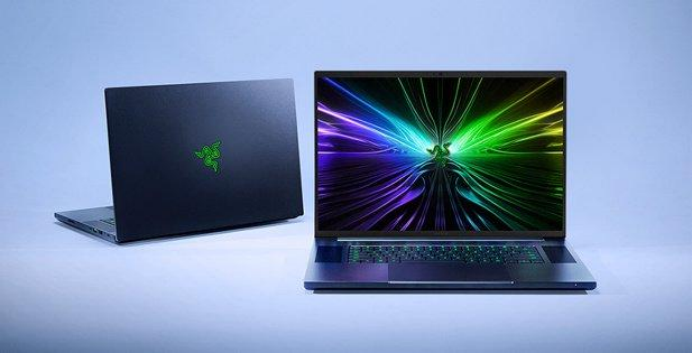
The Blade 16 is equipped with the new Intel Core i9-14900HX processor and up to NVIDIA GeForce RTX 4090 graphics card, making it a powerful gaming laptop, and is made of anodized aluminum alloy.
In addition, the Blade 14 is the most portable laptop in the Razer Blade series, equipped with the new AMD Ryzen 9 8945HS processor, which has enhanced Ryzen AI performance and can improve the workload of Windows Studio or AI tasks such as Microsoft Copilot.
Finally, Razer also released the all-new Fenshen V2 gaming chair, Ether display screen lamp, and USBC expansion dock, filling the "arsenal" of gamers.
Conclusion
New Voice of Metaverse has seen that AI PC has become the "protagonist" of this year's CES. These AI PCs not only have powerful performance and efficient computing power but also cover various functional scenarios such as performance optimization of devices, text generation in work scenarios, and image generation, while ensuring data and privacy security.
As the shipment volume of AI PCs continues to increase, it will also improve the overall PC market. In 2024, we have reason to believe that AI PC will change the way many people work and live, and it will also become a "shining star" in the field of technology.
免责声明:本文章仅代表作者个人观点,不代表本平台的立场和观点。本文章仅供信息分享,不构成对任何人的任何投资建议。用户与作者之间的任何争议,与本平台无关。如网页中刊载的文章或图片涉及侵权,请提供相关的权利证明和身份证明发送邮件到support@aicoin.com,本平台相关工作人员将会进行核查。




